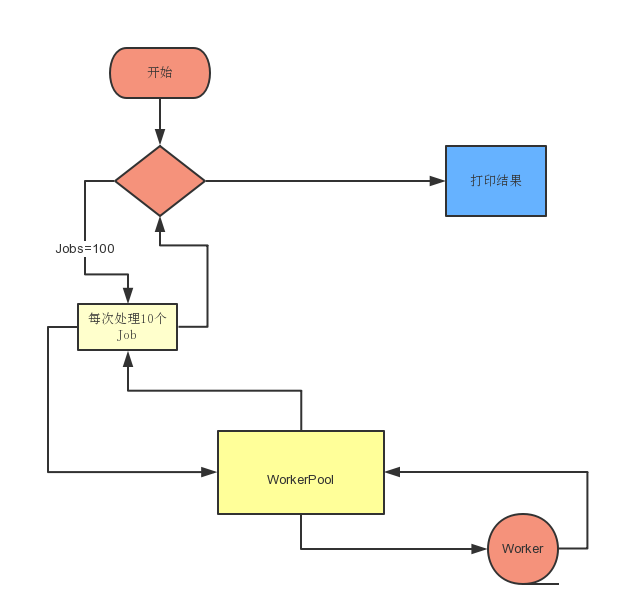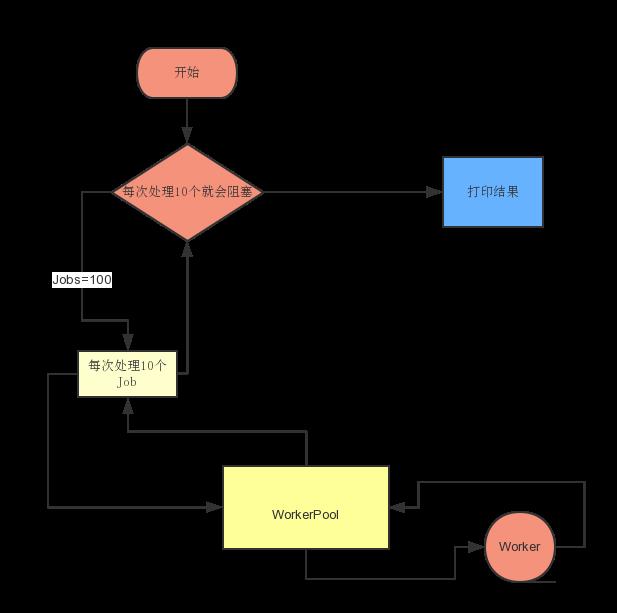篇首语:本文由小常识网(cha138.com)小编为大家整理,主要介绍了Buffered Channels and Worker Pools相关的知识,希望对你有一定的参考价值。
原文链接:https://golangbot.com/buffered-channels-worker-pools/
buffered channels
- 带有缓冲区的channel 只有在缓冲区满之后 channel才会阻塞
WaitGroup
- 如果有多个 goroutine在后台执行 那么需要在主线程中 多次等待 可以有一个简单的方法 就是 通过WaitGroup 可以控制 Goroutines 直到它们都执行完成
例子
import (
"fmt"
"sync"
"time"
)
func process(i int, wg *sync.WaitGroup) {
fmt.Println("started Goroutine ", i)
time.Sleep(2 * time.Second)
fmt.Printf("Goroutine %d ended\\n", i)
wg.Done()
}
func main() {
no := 3
var wg sync.WaitGroup
for i := 0; i < no; i++ {
wg.Add(1)
go process(i, &wg)
}
wg.Wait()
fmt.Println("All go routines finished executing")
}
Worker Pool Implementation
先贴一下个人理解的 程序执行的流程图

import (
"fmt"
"math/rand"
"sync"
"time"
)
type Job struct {
id int
randomno int
}
type Result struct {
job Job
sumofdigits int
}
var jobs = make(chan Job, 10)
var results = make(chan Result, 10)
func digits(number int) int {
sum := 0
no := number
for no != 0 {
digit := no % 10
sum += digit
no /= 10
}
time.Sleep(5 * time.Second)
return sum
}
func worker(wg *sync.WaitGroup) {
for job := range jobs {
output := Result{job, digits(job.randomno)}
results <- output
}
wg.Done()
}
func createWorkerPool(noOfWorkers int) {
var wg sync.WaitGroup
for i := 0; i < noOfWorkers; i++ {
wg.Add(1)
go worker(&wg)
}
wg.Wait()
close(results)
}
func allocate(noOfJobs int) {
for i := 0; i < noOfJobs; i++ {
randomno := rand.Intn(999)
job := Job{i, randomno}
jobs <- job
}
close(jobs)
}
func result(done chan bool) {
for result := range results {
fmt.Printf("Job id %d, input random no %d , sum of digits %d\\n", result.job.id, result.job.randomno, result.sumofdigits)
}
done <- true
}
func main() {
startTime := time.Now()
noOfJobs := 100
go allocate(noOfJobs)
done := make(chan bool)
go result(done)
noOfWorkers := 10
createWorkerPool(noOfWorkers)
<-done
endTime := time.Now()
diff := endTime.Sub(startTime)
fmt.Println("total time taken ", diff.Seconds(), "seconds")
}
